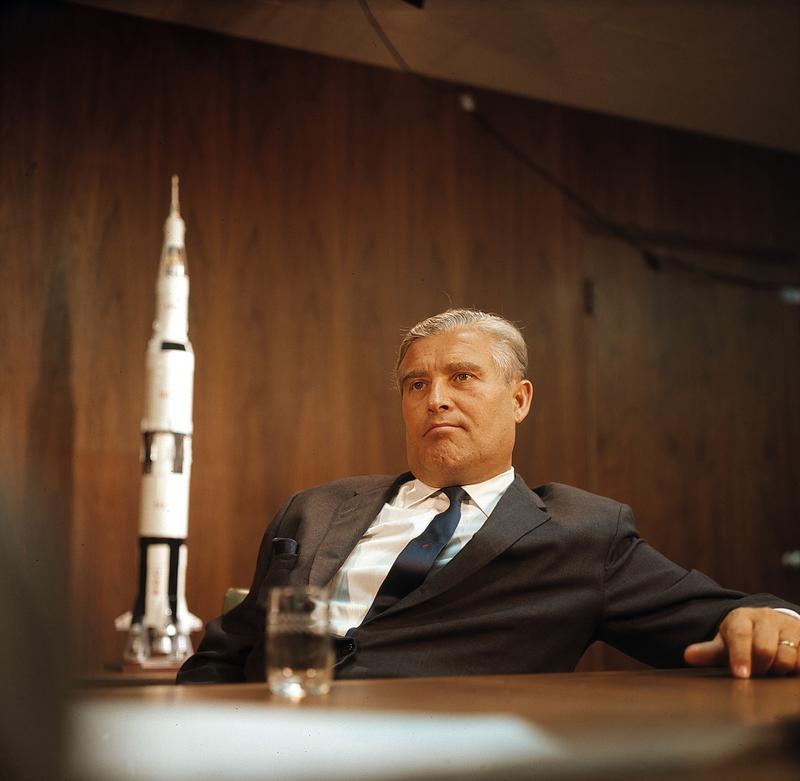
Douglas Cooper and George O’Brien speak with Wernher von Braun here, the German/American aerospace engineer who helped build rockets for the first U.S. space satellites and moon missions.
In the 1970s, when this interview was conducted, von Braun was a few years away from NASA’s mandatory 65 retirement cut-off. After some conversation with his secretary, some sound level checks, and some jokes about von Braun’s boss—the President of the United States—they talk about his retirement.
“Well, I don’t feel like retiring myself,” von Braun says, but he reminds them that space engineering is a fast moving art, and one can “get obsolete in a hurry.” Still, he plans to stay active for a long time.
He worries, though, that there isn’t enough coverage of space exploration. He complains that the networks did not air the “splashdown” of the men they brought back from 85 days on the space station, even though they’d done “prodigious feats” in outer space. He says that there is still interest among the American public, and that the networks feed people “irrelevant crap.”
Similarly, he says that grassroots support for space is high, and that the only reason NASA funding is limited is because of politics and budget cuts.
Still, he says, “space is here to stay,” just as aviation was. The space program generates tremendous payoffs, and in the “long haul,” it’s a fantastic success story. He gives an example of a medical method developed for the Apollo mission. They found ways to measure heartbeat, temperature and breathing remotely, and then radio them back to earth. This technology has since been adopted in intensive care units, he says—instead of 3 nurses to each patient, monitoring around the clock, the instruments can monitor the patient and call a nurse only when she is needed.
Douglas Cooper asks Wernher von Braun about his work with Fairchild, under contract for NASA’s broadcast satellite.
“This satellite is the epitome of what space can do for developing countries,” says von Braun. It will, he says, allow for TV broadcasts in remote villages in settlements without million-dollar receiving stations. In the United States, he says, this will be used to send educational and healthcare programming into the Rocky Mountains, Alaska and Appalachia. Then, the United States and India have an agreement—the same satellites will be used to send Indian-generated programming to 50,000 villages in India, to promote literacy.
“This is only the beginning,” he says, predicting that by the year 2000, most countries will use educational satellites as their primary educational tool. “We have here an example where a program called something only the super rich can afford is benefiting the poorest of the poor,” he argues, going on to list other benefits—satellite weather reports, earth resource surveys, and others.
George O’Brien changes the subject, asking about von Braun’s time at Iona College, which von Braun remembers fondly. Then O’Brien asks if von Braun finds personal satisfaction from the fact that two great Americans—himself and Kissinger—were both born in Germany.
“I do,” replies von Braun, but he modestly declares that Kissinger’s contributions to the United States have been more direct and visible. “I have only been instrumental to putting a man on the moon, and that cost a lot of money,” he says. Kissinger, he argues, saved lives with his peace effort in southeast Asia, and has accomplished many things in the Middle East.
They talk about von Braun’s childhood. He got into rockets at 14, he says—an amateur astronaut with a little telescope, who read astronomical journals. He only got into mathematics, he said, because of his interest.
Cooper jokes about his poor childhood math skills, comparing him to Einstein. “If you want to do something in rocketry, you learn math,” von Braun laughs, “Strongest incentive I ever had.”
He admits that he would love to go to the moon. He says that they are developing a reusable space shuttle to open space up to non-astronauts, so people from “all walks” can go up and work as astronomers, prospectors, or meteorologists. PhD students will write theses on the moon, he says, much like people study in Antarctica now. “Could be I could thumb a ride up there.”
“I’ve always been interested in the future,” he says as the interview comes to a close, “mainly because I figure that’s where I’ll spend the rest of my life.”
_______________________________________________________________________________________________________________
The Douglas P. Cooper Distinguished Contemporaries Collection (1967-1974) contains rare interviews with influential writers, statesmen, artists, songwriters, journalists and others who have left their mark on our culture.
The Origins of The Cooper Collection
WNYC archives id: 92035
